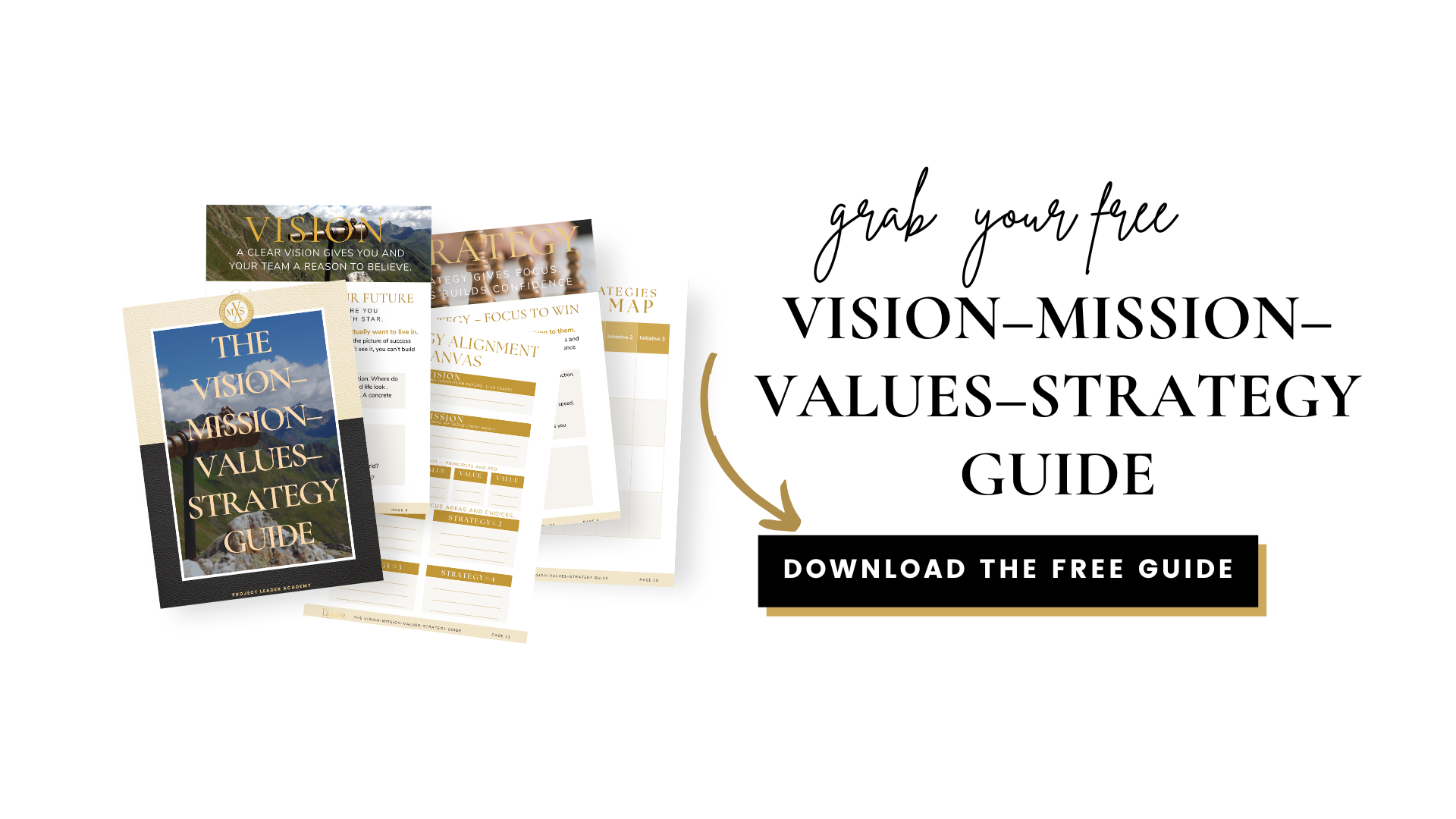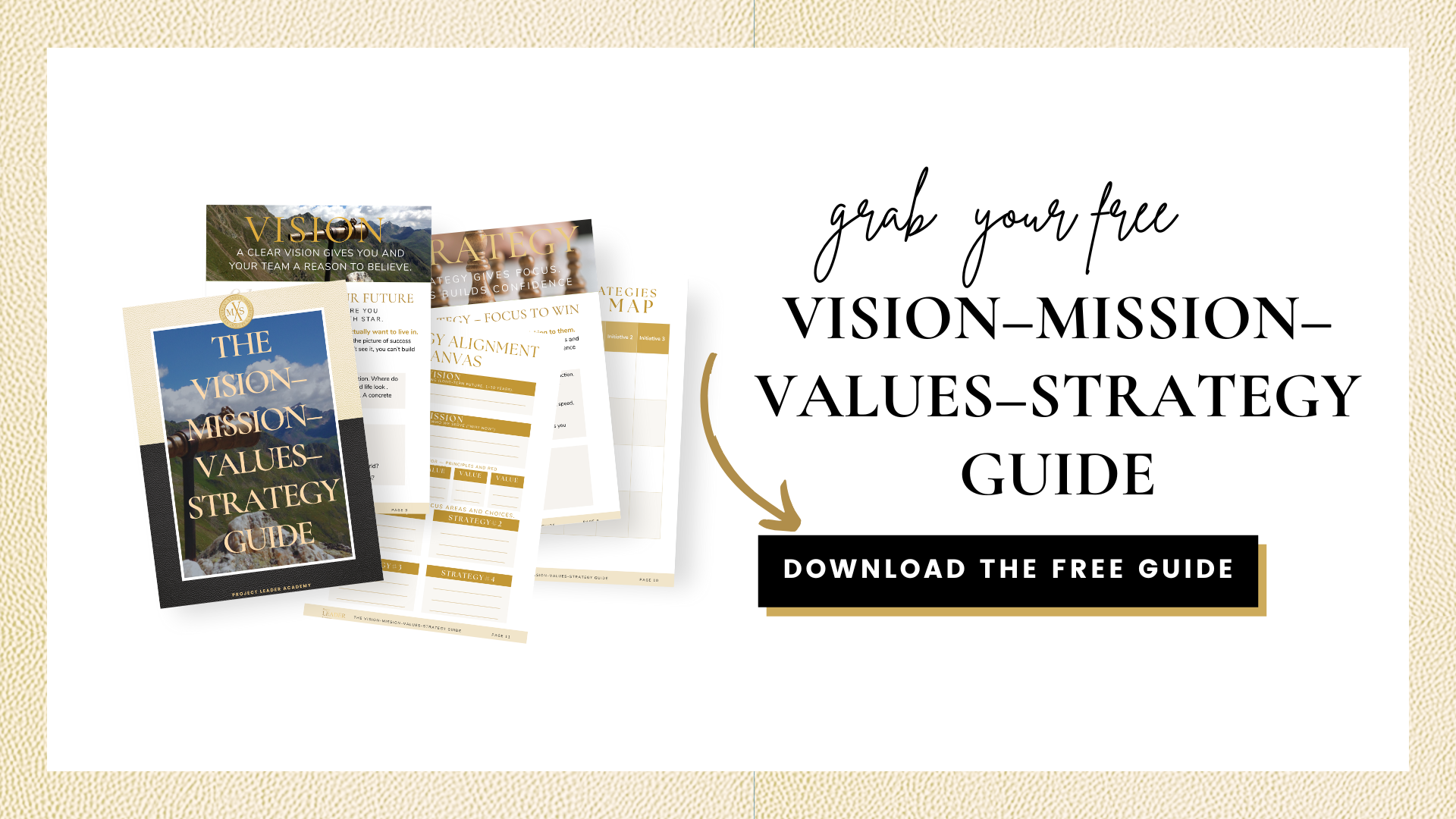How to create your Vision, Mission, Values & Strategy

In every VMVS workshop, there is always that moment when someone looks up from the flip chart and says: ‘Oh… NOW I finally understand.’ That moment changes everything.
What Is the Difference Between Vision, Mission, Values and Strategy?
Vision = Where are we’re going.
Mission = What do we do.
Values = How do we behave.
Strategy = How do we win
Have you ever been asked: "What's your mission?"
How do you like an answer "My mission is to generate profit?" I mean, a business needs, by default, to generate profit. Key account managers are measured by this profit KPI, and project leaders want to save costs. But profitability is not the overall mission for any project in business and life.
Finally it is the
Most organizations don’t struggle because teams are unmotivated. They struggle because there is no shared direction, no clarified purpose, and no aligned strategy that helps people pull in the same direction.
Before we go deeper, here’s the complete template so you can follow along:
Download the Vision–Mission–Values–Strategy Framework here
Define your business direction with the same 12-page framework I use with CEOs. Use the same step-by-step structure I teach in executive workshops. Click the image below to download your guide.
In this blogpost I want to share some of findings we found helpful, simplified it and used in our practical work.
Being a business consultant, mentor and leadership coach I had the pleasure to facilitate
What is the difference between an organizational Vision , Mission, Values and Strategy?
|
What element do you want to define? |
What does it mean?
|
What are the key questions?
|
Examples for
IT company |
|---|---|---|---|
| Vision |
The big dream for the future
What do we want?? Where do we want to go? |
• What do we want to be known for? • Where do we want to be in 5–10 years? • What future are we trying to create? What do we want to create? |
“We want to make tech so simple that every small business can run smoothly without an IT expert.” |
| Mission |
Why do we do what we do? Who do we want to be? What is — our purpose?
|
• What do we love to do for others? • Who do we help? • How do we make their lives easier? What services / products do we provide? |
“We build easy-to-use apps that help teams organize their work and solve tech problems fast.” |
| Values |
How do we do what we do? What are our rules we follow and how do we behave — even when no one is watching? What is our philosophy for decision making?
|
• What matters most to us? • How do we treat people? • What behaviours are non-negotiable? What are our guiding principles? |
“We keep things honest. We fix problems quickly. We stay curious. We keep software simple.” |
| Strategy |
How do we Our game plan — the path we choose to reach our dream. |
• What will we focus on? • What steps will we take? • What will we not do? |
“We focus on small companies first, improve our product every month, and only build features customers really need.” |
1. The Vision
What is an organizational vision ?
A vision is a vividi picture of the future.
A companies vision is a picture of the companies future.
The vision is the answer to the questions:
- What do you want?
- Where do you want to be in 5 years? 10 Years?20 Years?
- Imagine how does your company look like?
A vision is a
We think we can imagine what is possible in 1 year and usually overestimate our goals for one year and underestimate what is possible in 5 years or more.
You would be surprised how many companies - aka management teams struggle to answer this question especially in a fast changing world so many people fall back into a victim mentality and give up on a vision and have maximum 90 day goals.
I love 90 day goals but how do you make sure that you don´t change every 90 days the direction?
Some big projects take much longer than 90 days to accomplish. I was involved in projects : like modernisation of railway systems, construction of hospitals, pipelines, hotels, schools, streets, airports, telecommunication networks, solar and geothermal energy infrastructure. I am always fascinated by people who are developing new technologies, new medication, new treatments, developing of new markets, winning the olympics etc. . Long term thinking is so important we want to solve environmental issues and start projects to protect our planet, the oceans, the forests and the animals.. But talking and dreaming is not enough you need to craft a shared vision.
What is a vision statement?
A vision statement is a short
This vision statement is communicated to the public the employees and stakeholder.
An
It should be a
How to develop a vision statement?
Sit down in silence and really ask your self :
- What do I want for my company?
- Where do I see my company in 10 -20 years?
- How will my project look like when I had over the finished project to my client?
- Imagine....
Take time to create a movie in your head. That requires CEO time in silence or project leaders time in silence. You may use morning time and write in your journal..By practicing your vision become clearer.
In our workshops we used guided visualisation techniques, meditations, vision boards and lego serious play to inspire imagination beyond what you see today and allow a kind of time travel into the future.
Create a shared vision by sharing your dream and painting a vivi picture that others can see so that you can go together. In roundtable discussions with a flip-chart everyone writes his version of the vision statement and we facilitate a proven process so that the wording gets condensed and is easy to understand. We use templates and prompt guiding the leadership and project teams in this process to have fun and buy into that vision. Imagine everyone in your team is an ambassador for your big vision.
So lets imagine...
We help our clients to envision the future by using a number of powerful exercises like:
- Envisioning the future exercise
- Creating a Vision board exercise
- Vision statement writing
- Meeting the future you- time-travel exercise
- Vision workshop -with LEGO® Serious Play®
We alway look for new techniques that help your mind to imagine what is possible and hold space for our clients to do the work, Finally we help our clients to create a shared vision and craft a statement.
Here as some mistakes you want to avoid doing:
Mistake number #One You copy someone else vision statement from their website. and done.
Mistake number #Two The vision stays in the head of the business owner or dreamer and does not get shared with their team, friends and stakeholders,
Mistake number #Three: The vision is written down but nobody understands the statement.
2. The Mission
What is a Mission?
A mission should be a powerful purpose we live for and identify with in our
- How we serve others?
- What do we do?
- What service we provide?
- Who do we want to help how?
What is an
A mission statement is a
Here are some examples for good mission statements:
We help...
Our mission is ....
- To organize the world's information and make it universally accessible and useful
- To accelerate the
world’s transition tosustainable energy . - To connect the world’s professionals to make them more productive and successful.
Our Project Leader Academy
- To empower entrepreneurs to create successful projects for business and life.
- To bring project management, sales, and leadership skills to entrepreneurs around the world and help them to become better leaders.
This is how e help to make the world a better place.
This is how e help to make the world a better place.
How do we create a Missions statement?
Writing your mission statement down into sentences is hard work and takes some time.
We use a 5 step process fo developing missions statements with our clients:
1. Brain writing:
Gather what you know about your mission, what comes up what did people hear about your brand., what did you do in history, etc and collect all these sentences , words phrases on a white board. Please do not copy others companies mission statements. Rather sit in silence and listen to yourself and your team.
2. Define your mission scope
- Who do you help?
- What service do you provide?
- What benefit do you create?
- What value do you bring to the world?
3. Choose Key words :
Define powerful key word representing your mission ,
4. State your Mission
Develop some sentences for a missions statement and agree on the most powerful one. We love to facilitate this process with individual exercises, templates, group work and moderate large community discussions with professional techniques online and offline.
5. Communicate
Share your sentence and test your mission statement for understanding and make sure everybody in your organization knows it.
Here is a Mission statement template you can use
We help/empower/equip [target customer] to achieve/reach/eliminate [desire/painpoint] by providing/building/creating [tangible deliverables].
What is a slogan for a mission statement?
For marketing and communication purpose you may develop a marketing slogan - a short sentence - that represents your mission.
Nokia* =connecting people
3. The Values
What are values?
Values are the principles you stand for — your compass for how you behave, decide, and communicate. They guide everyday actions, shape culture, and make collaboration easier because everyone knows what “good” looks like.
Our values help us to answer the question s:
- Why do we want to go after that big vision?
- Why do we want to do what we see a our mission?
- What drives our decision making on our way?
Our values are the answer to the question:
- How will we behave?
- How do we want to behave towards that beautiful vision?
- How do we want to behave towards customers, colleagues, suppliers, our boss, our families and friends?
Values are beliefs or qualities that are really important to us. They help guide our actions and decisions. Different people and cultures have different values. Some common values include honesty, kindness, compassion, integrity, fairness, and respect.
Values of successful Leaders
- Honesty: Great leaders always tell the truth and do the right thing, even when no one is watching. They are trustworthy and people can rely on them.
- Kindness: Good leaders care about how others feel. They listen to them, understand their feelings, and help them when they need it. They make sure everyone feels included and valued.
- Having a Plan: Leaders have a clear idea of what they want to achieve. They imagine a better future and share their ideas with others to get them excited and working together.
- Taking Responsibility: Good leaders take ownership of their actions. They don't blame others when things go wrong. Instead, they admit their mistakes and try to make things better. They also help their team members do their best.
- Staying Strong: Leaders don't give up easily. They stay positive and keep trying, even when things get tough. They believe in themselves and encourage others to keep going too.
Remember, these are just a few of the important values that make a great leader. Being a leader means being a good example and helping others to succeed.
We work in our uncover your values facilitation process with different frameworks to help our clients understand the power of their values.
One important framework is .Graves' Spiral Dynamics that shows how values can change as people and societies grow and develop.
Finally, there's Dilts' Neuro-Logical Levels, which looks at how values are connected to other aspects of who we are, like our identity and beliefs.
These frameworks help us understand and study values, and they show us how values shape our behavior and the way we see the world.
We all have values and live and work by values. The big question is : How aware are we about our values? Do you know what is driving your decisions and the decisions of your organization?
Values are not a set of key-words that are nice to have. Values are the reflection of your subconscious and the your subconscious plays a significant role in shaping our beliefs, habits, and automatic responses.
With the 9 Levels values assessment we help our clients to uncover hidden values and make the values measurable. In preparation of such workshop we assess the values of the business owner and the the CEO team . In the workshop preparation phase we create a team values or organizational values assessment that we use in our values discussion.
In our coaching and consulting session we used many years a et of "value cards" and value exercises.
Download your value exercise here: Click here
The Logical Levels model of Dilts suggests that change and transformation occur more effectively when interventions are made at higher levels. In other words, if you want to create lasting change, it is often necessary to work at the levels of identity, values, and beliefs rather than just focusing on changing behaviors or the environment.
This is why we start any strategy process with defining the values.than we do the visioning exercise ,clarify our mission and once know our position and situation appraisal we decide on the key strategies we want to apply.
Strategy
Being strategic means not throwing spaghetti on the wall but f choosing and following a path that leads to achieving goals.
In business we will have to define sales strategies, product strategies, growth strategies, service strategies and so much more. But the key is to foocus s at a time s on 3-5 max to move towards your goals,
How do we apply Strategy to our business?
The Project Leader Academy has 3 key strategic initiatives as of today:( it could be that when you read this post that our strategy will have changed)
Situation
We have been delivering successfully a One year Project leader Training with 25 days in presence ( workshops) to CEO and Project Leader.
We had been consulting and coaching Presentation skills . Sales and Negotiation skills, Team building, Personal Development, Time Management, Moderating Meetings and summits and facilitated conflict resolution.
Being a serial entrepreneur in different industries.
Developing complex infrastructure project like Hotels, Hospitals, Traffic solutions and Transport solutions.
Product Strategy:
- Define and develop one High touch and high value Transformational program that is empowering Leaders to lead without formal authority.
- Provide affordable Project Planning consulting based on the winning curriculum of our Project Planning facilitation program Online so that we can serve our clients from wherever.
- Develop Templates and Mini-trainings inside our Membership.
- Build a community
Marketing and Sales Strategy:
Media Channels
- Blog post weekly.
- Podcast.
- Instagram.
Connect with clients
- Write emails.
- Build community.
- Offer Free Masterclasses.
Sales strategy
- Create product sales pages and sales webinars and launch 4 products per year.
Service Strategy:
- Provide best-in-class coaching and consulting services for our clients online.
Ready to Define and Align Your Business Direction?
Start with the Vision–Mission–Values–Strategy Guide
The next step will be to set measurable goals with deadlines and to turn our dreams and gaols into specific projects.
We help our clients to pick winning strategies and to define projects to implement these strategies. Here it is important to have a professional approach ton how to to define plan and execute projects to success.








